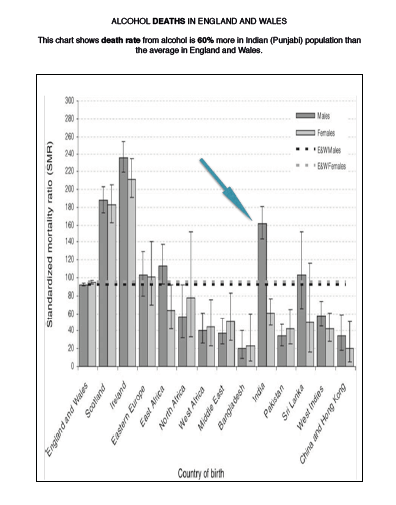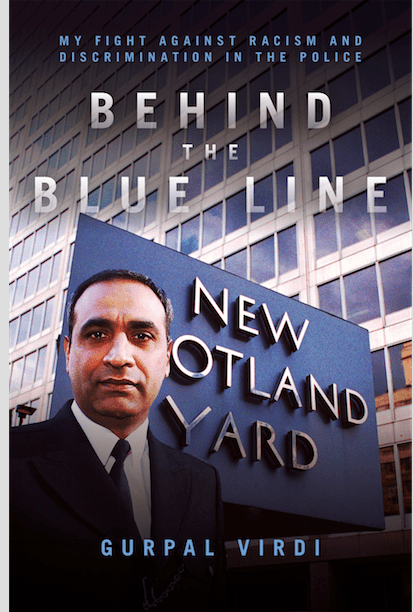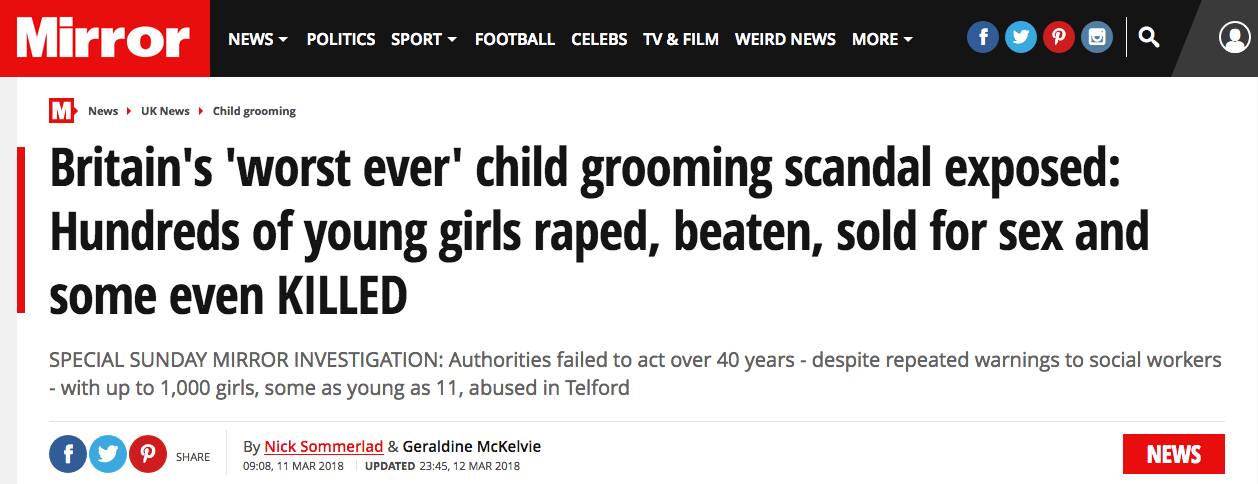
(Above: graph from Dr Pannu’s paper showing mortality relates related to alcohol abuse amongst different groups)
Dr Gurprit Singh Pannu’s editorial on the consumption of alcohol amongst different groups has over the years highlighted a troubling trend for Indians, and in particular Punjabis among them. It is well known that the Scottish and Irish have higher rates of alcohol consumption compared to England and Wales. However a recent paper shared by Dr Pannu on social media indicates Indians, (of which Punjabis are the most significant proportion) have a 60% higher mortality rate from alcohol use when compared to the average in England and Wales. This startling statistic is supported by evidence that indicates higher hospital admissions rates, (including psychiatric ones) than the general public. We all have a responsibility to reduce these admissions and deaths within our community.
To be clear Dr Pannu isn’t talking about the majority of Punjabis who drink socially, but a minority who end up on a slippery slope, which eventually leads to higher mortality rates, and associated social problems. Criminality, domestic violence, workplace problems and social disorder are just some of the consequences pointed to in the paper. Just on domestic violence, according to Dr Pannu’s paper a third of all cases nationally are linked to alcohol abuse, with over one million children affected by their families problematic circumstances.
Although the consumption of alcohol is strictly prohibited in Sikhism, the Punjabi contingent highlighted by Dr Pannu of course includes those of Sikh heritage, who are culturally predisposed to drinking. This admittedly could be either Punjabi culture or British pub drinking culture, given these statistics would incorporate British born Punjabis as well as those born in India. It is interesting to note that those of Pakistani heritage, presumably because of stricter adherence to alcohol prohibitions in Islam, have significantly lower alcohol related death rates than Indians. It is a matter of huge embarrassment that non-Sikhs who attend Sikh weddings often marvel at the free flowing bottles of spirits and alcoholic beverages available at receptions, walking away with the wrong impression Sikhs are permitted to drink.
The NSO has supported Dr Pannu’s positive work over the years, and to this end we will be organising a series of workshops with experts to discuss the issue of alcohol abuse among Punjabis. We acknowledge there is a lot of good work out there already, however one of our aims will be to signpost families to access appropriate medical services and local support network’s essential for the process of rehabilitation from alcohol abuse. This knowledge must be readily accessible to all, and we look forward in working with Dr Pannu and allied healthcare professionals to address a social ill we cannot afford to ignore.
Dr Pannu said, ‘Alcohol misuse in Punjabi men is driving a large excess of admissions to general and psychiatric hospitals with 60% higher death rates than the rest of population in England. There is also evidence that Punjabis are more susceptible to organ damage caused by alcohol.’
He went on, ‘These people represent just the tip of the iceberg, with community studies showing high rates of liver damage in apparently well people. Also the associated social problems are often hidden from view. The solutions include prevention. How can we as Punjabis reduce our overall drinking to amounts similar to the general population? This is the key to stopping unnecessary pain and suffering in Punjabi families.’
The NSO’s Director Lord Singh said, ‘I am delighted to support this important initiative. Dr Pannu gave a thought-provoking presentation to a meeting of the NSO a few years back in which he highlighted the serious and disproportionate problem of alcohol abuse in the Punjabi community and we have continued to act on his advice and guidance. Despite clear warnings in Sikh teachings against the use of intoxicants, alcohol abuse is sadly all too evident among some in the Sikh community, leading to serious health effects, domestic violence and family breakdown. Many Sikhs in prisons are there for alcohol related crimes.’
He added, ‘Guru Nanak reminded us that the consumption of alcohol dims our awareness of our priorities and responsibilities. The proposed workshops recognise a real problem and will help many to get back to the direction of the Guru’s teachings.’




